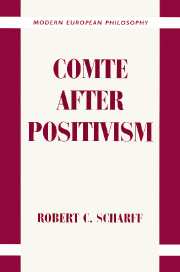Book contents
- Frontmatter
- Contents
- Preface
- Acknowledgments
- Note on Citations
- COMTE AFTER POSITIVISM
- Introduction: Comte for a Post-Positivist World
- Part I Comte Then
- 1 Mill versus Comte on Interior Observation
- 2 Mill versus Comte as Positivist Philosophers of Science
- 3 Comte's Three-Stage Law
- Part II Comte Now
- Bibliography
- Index
2 - Mill versus Comte as Positivist Philosophers of Science
Published online by Cambridge University Press: 06 July 2010
- Frontmatter
- Contents
- Preface
- Acknowledgments
- Note on Citations
- COMTE AFTER POSITIVISM
- Introduction: Comte for a Post-Positivist World
- Part I Comte Then
- 1 Mill versus Comte on Interior Observation
- 2 Mill versus Comte as Positivist Philosophers of Science
- 3 Comte's Three-Stage Law
- Part II Comte Now
- Bibliography
- Index
Summary
Now that it is clear how Mill's account of Comte's critique of interior observation is mistaken, the next step is to note that this is not an isolated mistake. It is, as we are about to see, one of at least three similar misinterpretations of Comte by Mill; and in each case, the explanation for it is the same. Mill misses Comte's point not, say, out of his enthusiasm for some particular idea that Comte is against or due to unfamiliarity with certain texts or sources, but because he wrongly assumes that Comte is speaking from a philosophical perspective that is essentially like his own. Comte's idea of what it means to be a positivist, however, is fundamentally different from Mill's. Before beginning my diagnosis of Mill's misinterpretations, then, I want to say a few words about the difference in their positivisms.
Philosophy “of” science?
The key factor here is that Comte's view of philosophy's relation to science is not what one expects from a nineteenth-century positivist. According to received wisdom, nineteenth-century positivists are of two types. All reject metaphysics and embrace the scientific ideal for knowledge, but the original (“systematic”) proponents use what they take to be the ultimate implications of this ideal to develop totalizing conceptual schemes and programs of Utopian sociopolitical reform.
Information
- Type
- Chapter
- Information
- Comte after Positivism , pp. 45 - 72Publisher: Cambridge University PressPrint publication year: 1995
